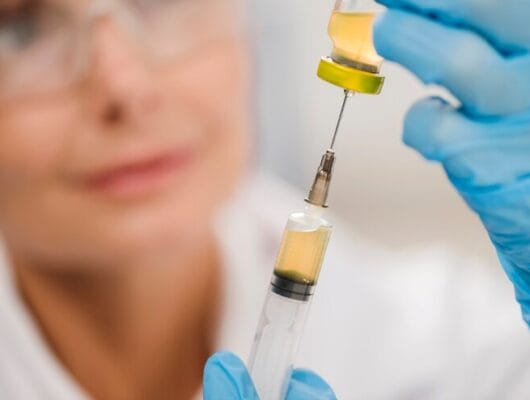In the quest for better health and vitality, many people are eager to explore natural ways to boost their testosterone levels. One such avenue that has gained significant attention is the role of zinc. This essential mineral plays numerous critical roles in the body, and some studies suggest it may positively impact testosterone production. In this blog, we’ll delve into the science behind zinc and its potential effects on testosterone levels to help you make informed decisions about your health.
Understanding Zinc’s Importance:
Before we explore its connection to testosterone, let’s grasp the significance of zinc in the body. Zinc is one the most essential trace minerals involved in numerous physiological processes. It’s crucial for immune function, wound healing, DNA synthesis, and the function of more than 300 enzymes in the body.
Zinc and Testosterone Production:
Several studies have examined the relationship between zinc and testosterone levels. Zinc is known to play a role in the development and function of the testes, where testosterone is produced. Additionally, it’s involved in the conversion of cholesterol into testosterone.
Research has shown that individuals with zinc deficiency tend to have lower testosterone levels. Therefore, it’s logical to assume that correcting a zinc deficiency could increase testosterone production.
The Evidence:
While some studies suggest a connection between zinc supplementation and increased testosterone levels, the results are inconsistent. Here are some key findings:
- Studies in Deficient Individuals: The most significant increases in testosterone tend to occur in zinc-deficient individuals. In these cases, zinc supplementation can bring testosterone levels back to normal or optimal levels.
- Aging and Testosterone: As men age, testosterone levels naturally decline. Some research suggests that zinc supplementation may help mitigate this decline and support healthier testosterone levels in older individuals.
- Exercise-Induced Effects: Intense physical activity, such as weightlifting, can temporarily lower zinc levels in the body. Supplementing with zinc, in these cases, may help maintain testosterone levels.
Zinc-Rich Foods and Natural Sources:
Before considering supplementation, it’s essential to evaluate your dietary intake of zinc. Many foods are rich in zinc, including:
- Oysters
- Red meat
- Poultry
- Dairy products
- Nuts and seeds
- Whole grains
- Legumes
Adding these nutritious foods into your diet can help you get adequate zinc naturally.
Supplementation and Dosage:
Suppose you suspect a zinc deficiency or are interested in using zinc to support testosterone levels. In that case, it’s crucial to consult with one of our practitioners at Rejuvenatehrt to ensure proper application. They can discuss with you your individual needs and recommend an appropriate dosage.
Zinc supplements are available in various forms, including zinc gluconate, zinc sulfate, and zinc picolinate. The recommended daily intake for zinc varies by age and sex, but it generally ranges from 8 to 11 milligrams for adults.
While zinc does play a role in testosterone production, its effects on testosterone levels are most significant in individuals with a deficiency. If you suspect a zinc deficiency or are concerned about your testosterone levels, it’s best to consult with a healthcare provider. They can assess your needs, recommend appropriate supplementation if necessary, and help you make informed decisions about your health.
As with any dietary supplement, it’s essential to prioritize a balanced diet rich in essential nutrients, including zinc, and approach supplementation with caution and professional guidance. Maintaining overall health and well-being involves a holistic approach beyond individual nutrients and factors in lifestyle, diet, exercise, and stress management.
Ashwagandha, also known as Withaniasomnifera, is an adaptogenic herb that has gained popularity in traditional and alternative medicine for its potential to improve overall well-being and manage stress. Some studies suggest that ashwagandha may positively impact testosterone levels, although the effects may not be dramatic or universal. Here’s what the research says:
- Stress Reduction: One of the primary ways ashwagandha may indirectly influence testosterone levels is by reducing stress. Stress, more times than not, can lead to elevated levels of cortisol, which can suppress testosterone production. Ashwagandha’s adaptogenic properties may help reduce cortisol levels, potentially allowing testosterone to function more effectively.
- Human Studies: Several studies have explored the effects of ashwagandha supplementation on testosterone levels. While the results have been somewhat mixed, some studies have reported modest increases in testosterone levels in men who took ashwagandha supplements.
- Animal Studies: Animal studies have also shown potential benefits. Some research on rodents suggests that ashwagandha may have a stimulating effect on testosterone production.
- Human Variability: It’s essential to note that individual responses to ashwagandha supplementation can vary. Not everyone may experience a significant increase in testosterone levels. Factors such as baseline hormone levels, age, and overall health can influence the extent of the response.
- Dosage and Duration: The dosage and duration of ashwagandha supplementation may also affect its effectiveness. In some studies, positive effects on testosterone have been observed with higher doses and longer durations of supplementation.
- Overall Health Benefits: While ashwagandha’s potential to increase testosterone is attractive, it’s important to emphasize that its benefits extend beyond hormone regulation. Ashwagandha is known for reducing stress and anxiety, improving sleep, enhancing cognitive function, and supporting overall mental and physical well-being.
How Rejuvenatehrt can help with your supplement adherence?
Monitoring the intake of zinc and ashwagandha, along with their potential impact on testosterone levels, is a crucial part of optimizing your hormonal health. RejuvenateHRT can play a valuable role in guiding and supervising this process through a personalized approach. Here’s how RejuvenateHRT can assist:
- Initial Assessment: RejuvenateHRT begins by conducting a comprehensive assessment of your health and hormonal profile. This assessment helps identify any underlying deficiencies, imbalances, or specific health concerns that may be affecting your testosterone levels.
- Dietary Guidance: RejuvenateHRT’s healthcare professionals can provide dietary guidance tailored to your individual needs. They can recommend foods rich in zinc and ashwagandha, as well as other nutrients that support hormonal health. These dietary recommendations can help you obtain these nutrients from natural sources.
- Supplementation Guidance: If it’s determined that you may benefit from supplementation, RejuvenateHRT can recommend appropriate dosages of zinc and ashwagandha based on your specific health status and goals. The clinic can guide you in selecting high-quality supplements to ensure safety and efficacy.
- Monitoring and Adjustments: RejuvenateHRT provides ongoing monitoring of your progress. Regular check-ins and assessments help track changes in your hormonal levels and overall health. If necessary, adjustments to your supplementation regimen can be made to optimize results.
- Stress Management: As stress can significantly impact hormone levels, RejuvenateHRT may incorporate stress management techniques and lifestyle recommendations into your plan. Reducing chronic stress can positively influence your hormonal balance.
- Regular Testing: RejuvenateHRT can facilitate regular hormone testing to assess the effectiveness of your protocol. Testing can include measurements of testosterone, cortisol, and other relevant hormones. These tests provide valuable insights into your progress and guide any necessary adjustments.
- Personalized Care: RejuvenateHRT’s approach is highly individualized. They take into account your unique health history, goals, and responses to treatment. This personalized care ensures that your protocol is tailored to your specific needs.
- Holistic Approach: RejuvenateHRT emphasizes a holistic approach to hormonal health. They consider factors such as diet, exercise, sleep, and overall lifestyle in addition to supplementation. This comprehensive strategy supports your overall well-being.
- Education and Support: RejuvenateHRT provides education and support throughout your journey to better hormonal health. They can address any questions or concerns you have and help you make informed decisions about your health.
Conclusion:
In summary, RejuvenateHRT can help you monitor and optimize your intake of zinc and ashwagandha for the potential increase in testosterone levels. Their personalized approach, guided by experienced healthcare professionals, ensures that your protocol is safe, effective, and tailored to your specific needs and goals. Monitoring your progress through regular assessments and testing allows for adjustments as needed to achieve the best possible results in your journey toward hormonal balance and improved well-being.












